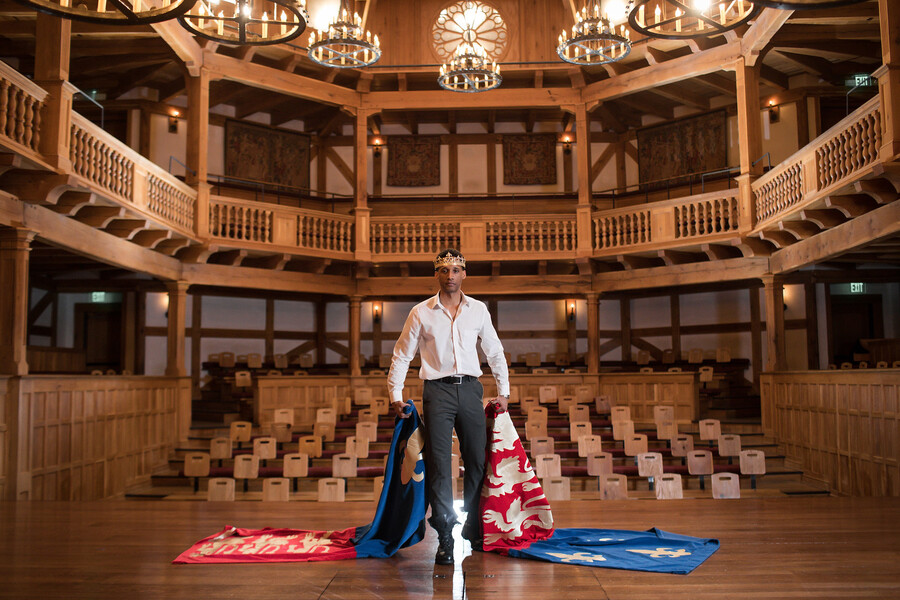As a child, André De Shields (he/him) had a desire to be Sammy Davis Jr. At least, that’s the best way De Shields can describe it. It wasn’t a need to actually be Davis, since, as De Shields put it, Davis was “the greatest entertainer that ever lived,” but to follow a trail Davis blazed for Black performers.
As De Shields prepares to take the stage this summer, once again stepping into one of Shakespeare’s iconic roles as the titular character in St. Louis Shakespeare Festival’s outdoor staging of King Lear (June 2-27), featuring all performers of color, De Shields has, in a sense, become Davis to many others. Much as Sammy once did for young André, De Shields’ work in a world of heightened text where whiteness is too often the default provides a powerful counterexample for young Black actors who, when they venture into Shakespeare and other Western classics, often struggle to see themselves.
It’s a struggle that Brandon Carter (he/him), actor manager at American Shakespeare Center, is intimately familiar with, and one that came from outside influences as he was growing up. Carter recalled first being drawn to Shakespeare’s words when he was in school. He would read and process the words he’d never heard before, wondering why they weren’t being used anymore. These elaborate speeches and dialogues stood in sharp contrast to the verbal shorthand of his hometown in Northern Virginia.
“And I said, ‘Okay, I think I could be onstage and do this,’” Carter explained. “But I was met automatically with folks trying to change the way I spoke or the way that I looked. I was always resistant to that.”
This pressure is nothing new, and it’s something that many Black performers—drawn to Shakespeare’s language and his roles, but often not seen as welcome in them—constantly find themselves up against, as they work to carve out the space to be themselves in a realm where centuries of preconceived notions dominate. Just finding examples and precedents can be a struggle, as Carter pointed out to me. When he researches roles, like many actors, he tracks back who has played those roles throughout history. This summer he’s taking the stage as King Henry V, rounding out his journey through the Henriad after playing Hal in both parts of Henry IV, in ASC’s Actors’ Renaissance summer production of Henry V.
In his preparation, he dug back to 1955, to Richard Burton’s run in the role, and saw white actor after white actor in pictures of the role. It led him to wonder: Where were the records of the Black men who came before him? Robert Hooks, maybe? Carl Cofield? Ty Jones? Where are the historical production photos, the reviews, the Playbills, telling artists of color—or in his case, Black men—that they’re allowed to be princes and kings?
“Where are these performances that Black actors can look at and be inspired by?” Carter asked. “It shouldn’t be something that’s hidden in a newspaper article in the ’90s or something like that. Andre Braugher, he played Henry V at the Public. Where’s that performance?”
Carter knows that for some in the Shenandoah Valley, he may be the first Black King Henry they’ve seen, and for young audience members of color, that could make all the difference. Ty Jones (he/him), producing artistic director of the Classical Theatre of Harlem, said that being able to see performers like Braugher and Chuck Cooper in these roles opened doors for him. Much like Carter, Jones was originally drawn to the work, introduced to Shakespeare through a high school production where he played Bottom in A Midsummer Night’s Dream. It wasn’t until later on in academia that he became more aware of how, as he put it, the plays can become fodder for academics leading to external conversations affecting his approach to the work.
“These plays are meant to be dramatized,” Jones said. “It was only after you learned more about how people interpret these pieces, and about those who interpret them who think of people of color in a certain way doing these plays—the more I learned, the more I think I became insecure about it, actually.”
Jones acknowledged that there are those who will disagree with the idea that Shakespeare’s work is meant to be performed rather than read in a classroom. But Jones said he still encounters people in the industry who struggle with the idea that Black people can be, and are, exceptional in classical work. And that can prey on the minds of Black actors. Jones called these nagging concerns and insecurities “cobwebs.” These accumulated cobwebs made it tough for Jones to reconnect to the joy he felt as a teenager playing Bottom, back before the conversation became about being a Black man playing Bottom. Part of the problem, Jones continued, is the way that Shakespearean work, and work of other Western classical writers, can be held up as the very pinnacle of theatre.
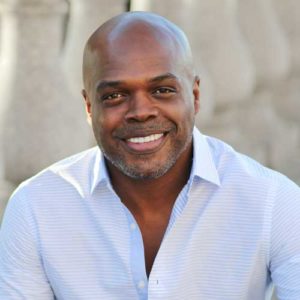
“I think people look at some of these classic plays of Shakespeare as some superlative holy writ, as opposed to looking at them as living arguments,” Jones said, pointing to the way Shakespeare, as well as other Western classical playwrights, used their work to comment on the ruling class. “I just don’t think Shakespeare or these classic writers should live in some sort of academic examination of what the author was thinking or the motivation of some character. I really think it’s much bigger than that. I think Shakespeare and Molière and Alexandre Dumas found this artful, crafty, damn near clandestine way to comment on the absurdities of the ruling class without suffering consequences.”
It’s an important conversation, especially when considering that the ruling class, at least in terms of race, has done much of the interpreting of these works over the years, shaping these stories through their lens. This leads to people posing the question as, how do people of color fit into Shakespeare’s world? The question could more simply be how they allow Shakespeare to fit into theirs. It’s a thought that director Carl Cofield (he/him) came up against as he was studying theatre. When he was told that they were going to be working on Shakespeare and the Greeks, Cofield said he vividly remembers responding, “I’m not going to mess with Shakespeare because Shakespeare never messed with me.”
Luckily, Cofield had a teacher who saw something in him that he didn’t see in himself. He was told he could do it, that he could be Mark Antony or Henry V. He’s carried this sentiment and emphasis over to his work as both director—leading both St. Louis Shakes’ production of King Lear and Classical Theatre of Harlem’s Seize the King, playwright Will Power’s rethink of Richard III, this summer—and teacher, where he is set to become the chair of NYU’s grad acting program. A foundation of his directing and teaching is dispelling the notion that this work doesn’t belong to people of color and instead giving them agency in the work.
“I’m a Black man of a certain age who grew up in the golden age of hip-hop,” said Cofield. “So for me, one of my ins was finding the similarities between a soliloquy and a Public Enemy rap song. Using wit, using puns, and creating this vivid story coupled with a rich imagination.”
The hope is that those around him, and those who come after him, will be able to have a smoother journey to find their freedom in the language—that heightened text isn’t something that people of color need to fear, and importantly is not something they need to conform to. In his theatre training, Cofield explained, much focus was put on smoothing out regional dialects to create a more mid-Atlantic newscaster sound. That same kind of work surrounds Shakespeare training. But, as Cofield noted, that robs us of, say, the musicality that an Appalachian drawl can bring to heightened text. It could also potentially rob us of beautiful performances.
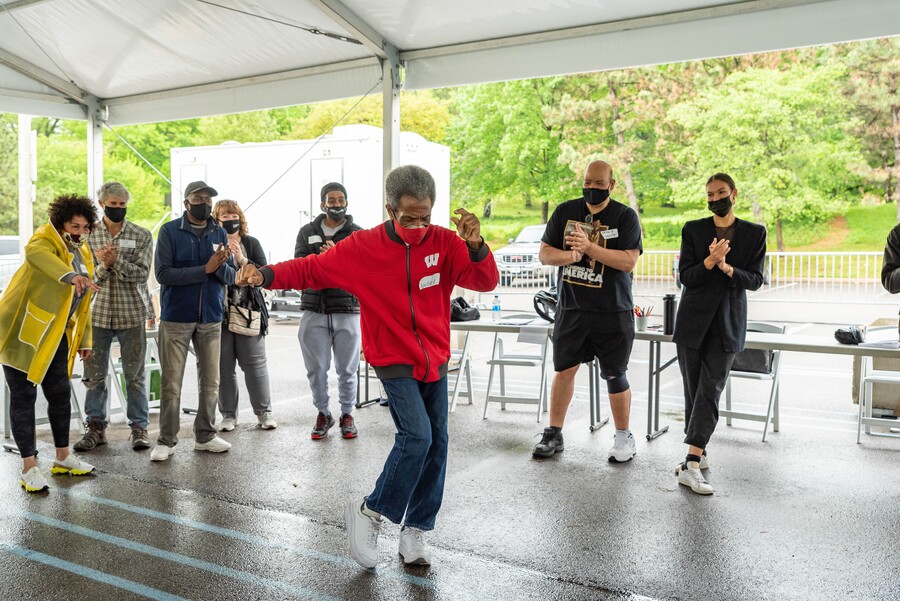
When De Shields was an undergraduate at the University of Wisconsin Madison, he and Stuart Gordon were frustrated that they were not being included in mainstage productions. Though no one would have outwardly said it was because of his ethnicity or skin color, De Shields said, he knew it was because of “the status quo.” He wasn’t studying drama and didn’t have training in the classics—his undergraduate degree is in English—but he knew he had a gift and a dream he’d been carrying close to his vest his whole life. Performances like “Bubbles” John W. Sublett in the 1943 film Cabin in the Sky spoke to him, opened the door, welcomed him in. While not specifically drawn to Sammy Davis’s world of music or Sublett’s world of film, De Shields was pulled to all-around entertainment.
After Gordon founded Screw Theater in 1968, De Shields worked with Gordon on the theatre’s first production, an adaptation of Titus Andronicus called Vis—the Latin term for “force,” De Shields said, a reference to the play being “dyed in violence.” De Shields played Aaron, one of only a handful of Black characters in Shakespeare that predate Othello, in a production that understood the line “paragon of animals” to mean “most violent of the animals.” De Shields related it to parts of 2001: A Space Odyssey, as the production involved grunting through the text, with the only spoken line coming from De Shields: “Give me my baby.”
“That was obviously a huge influence on me having not done Shakespeare previous to that,” said De Shields of working with Gordon, who would later found Chicago’s Organic Theater. “For the four years I spent in Chicago after graduation, my theatre experience was experimental in the same vein. It wasn’t until I came to New York in 1973 when, because of my ‘idiosyncratic’ training, people were interested in casting me in the classics.”
He credits Classical Theater of Harlem founding artistic director Alfred Preisser as the first person to cast him and see him as a protagonist and leading man when Preisser approached him about being in Derek Walcott’s Dream on Monkey Mountain. Their working relationship led to De Shields’s first stab at Lear in 2006 at the age of 60. The combination of working on Vis, Dream of Monkey Mountain, King Lear, and a production of Caligula, De Shields said, placed him in the classical canon.
“Once you are embraced by that community, then it turns other people’s heads,” said De Shields, who admitted he hasn’t had a typical experience with a troupe of actors working on Shakespeare, as others might have. “From the experimental theatre birth, people said in certain terms or implied that they weren’t ready to take that kind of risk. But it all worked out for me, because I haven’t had to compromise the authentic actor that I am in order to do classics. Now people see something commanding in me that they want in a Shakespeare play, particularly since more people give lip service, at the least, to the doctrines of inclusion, equity, and diversity.”
“Don’t ever let someone take something away from you and ruin your opportunity to be king. You, you could be king.”
A space for Black actors to exist authentically is something that has continued under Jones’s leadership. ASC’s Carter reflected on working with the Classical Theater of Harlem on a production of The Tempest, where he said he was able to claim his space as a Black actor surrounded by, and supported by, an all-Black cast. It was something he’d never experienced before. In college, like many, Carter felt the pressure of having a so-called “real major.” He minored in theatre alongside, variously, majors in either business, public relations, or organizational and strategic communications, until he eventually flipped his interest fully to majoring in theatre and subsequently pursuing a masters at Penn State, where he met Steve Broadnax and Jim Wise.
Up to that point, he knew choices around his casting had been made based on how he looked (tall, handsome, Black), but he had continually been met by an old guard who said there was a certain way classical work should sound and be done. He struggled to feel like his voice was being heard. “It didn’t feel organic to who I was,” Carter said.
But suddenly he had Broadnax in his ear, telling him, “‘Don’t ever let someone take something away from you and ruin your opportunity to be king. You, you could be king.’ That’s what he kept reminding me of. And I started to examine my mission as an artist. I wanted to break the legacy. I wanted to change what that looked like.”
Even when he joined the Classical Theater of Harlem’s production of The Tempest, he was reluctant at first, seeing actors ad libbing Shakespeare, not sticking firm to the iambic pentameter. It was explained to him that there’s a need to feel this work from your own lived experience, from within the particular frame of reference he specifically could bring to the work. That experience, he said, “opened my whole world up.”
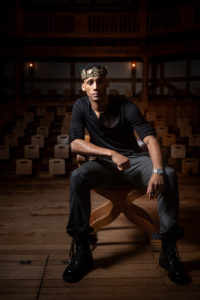
“I didn’t have to explain a choice,” Carter said of the production of The Tempest, in which he played Gonzalo. It was a character, he explained, that was trying to keep the peace and be mindful of the future, a role he felt was similar to that of Laurence Fishburne in Boyz n the Hood. “I didn’t have to explain that to folks,” he continued. “When I’m doing that in a predominantly white cast, I have to explain, I have to bring my research to the table. I have to. Folks are always challenging my actions, my choices, and it seems more of a battle trying to explain. I often found myself in all-white casts dropping the choice rather than moving forward with it.”
Even Cofield admitted that it can be difficult convincing people to flex the creative, imaginative muscle that would allow people of color the full freedom to explore these choices. He pointed to examples, like the difference between “The Star Spangled Banner” as written by Francis Scott Key versus how it was performed by Jimi Hendrix. “It resonates in an entirely different way,” Cofield said, adding that he hopes to similarly reimagine some of these classics.
As an example he pointed to is Falstaff, whose wit and love of life reminded Cofield of his uncles and his dad and his barbershop growing up. It’s not hard, he said, to imagine, or reimagine, a Shakespearean tavern that echoes that experience. Jones shared a similar sentiment, saying that he encourages people of color to make Shakespeare and classical texts fit into their world, rather than trying to conform to a received or studied version of it.
“You can unapologetically be you,” Jones said, acknowledging that even he still finds himself having to carry himself a certain way when doing aspects of his job, like fundraising. “How I comport myself is how they see me. There’s no utopia, because I do want them to write a check, but it does mean that there’s a part of me that they’re not going to see. But that’s what I love about art; that it’s a way and a chance and a possibility where I can express it in a different way. I have a little more say when I’m onstage, like I’m in a safe space when I’m onstage to be able to engage in that sort of expression.”
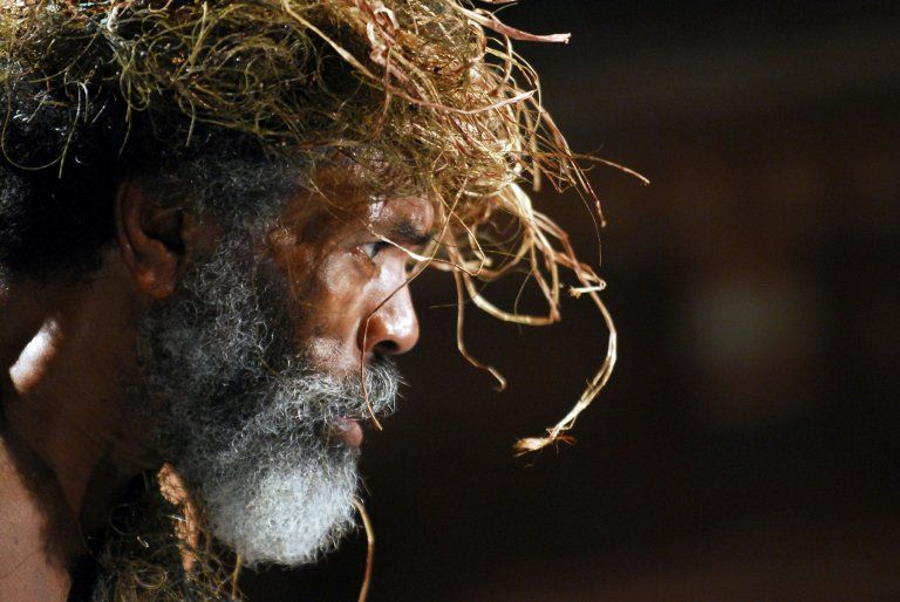
After his first time playing Lear, De Shields made a promise to himself to revisit the role in 10 years, thinking that, at that point, he’d have more life experience to bring to the character, as opposed to an approach he described as all “adrenaline, gall, and courage” in his first production of it. Now, despite still being 10 years younger than the age specified by Shakespeare, De Shields said he has “more pathos, empathy, more experiential evidence to bring to a character that most people refer to as insane, demented, mad.” The production is set in a postmodern, futuristic police state in North African country where, as Cofield shared, having a dictator of color is not uncommon.
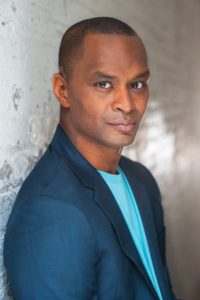
“What makes these heightened texts so vital are the questions that they ask about who we are as a society, who we claim to be, and who we actually are,” said Cofield. “I love those questions because, in the true spirit of universality, where everybody can relate to a story, of course we should reimagine them with people of color, because those stories transcend and really force us to engage in conversation about who we are.”
As De Shields worked on his Lear, who he said he thinks of as a despot in need of healing and redemption, he came to a realization both for the character and for life in general. For him, it led to a reflection on the friends he lost during the AIDS epidemic: “Instead of focusing on the decay of the corporeal body, we should focus more on the decision that the spirit makes when it leaves the body. That it’s been served well, but it is in search of a higher love. This is the culmination of the relationship between Lear and his favorite daughter, Cornelia. At the end of the piece, he does that great ‘howl, howl, howl’ speech, and then dies upon her breast in a halo of redemption.”
Similarly, as Carter dug into the character of King Henry, he found similarities in the pressures Hal had faced from father figures in his life with the expectations the world has around who or what Black men can be in the world—and now not simply what it means to be a Black prince, but a Black king. He pointed to the continued mistreatment of Meghan Markle after marrying Prince Harry and the racism that has followed them.
As De Shields emphasized to me, there’s a perspective that Black people, or more specifically African Americans, can bring to this work that is unlike many others. While other nuances can be found in other cultures and people of color, De Shields noted that there’s a difference for a culture upon whose enslavement capitalism grew.
“African Americans are the most unique culture on the planet,” De Shields said. “Why? Because our culture begins with enslavement. Every other culture on the planet has a golden age, a mythological age. And from that golden mythological age, the crowned heads of societies received their legacy, received the authenticity that they claim, received the evidence that they are vicars of God on Earth. We African Americans don’t have that kind of legacy. Africa does. The Blacks who were kidnapped from Africa, brought to the new world, and enslaved—enslavement is the beginning of our culture.”
The United States, he continued, this great experiment in democracy, was born and nursed on the pain of Africans who were stolen from their country and learned a new language, religion, and culture, and who found a new determination not only to survive, but to thrive and ultimately prevail. The latter era is what De Shields says we are beginning to experience now, a culture that demands attention be paid, because Black lives do matter. As De Shields put it: If you can’t embrace and understand the lived experiences of African Americans, you can’t begin to understand this country.
“That’s what I specifically think I bring to the characters that I have created,” said De Shields. “The Wiz, Ain’t Misbehavin’, The Full Monty, Hadestown. It’s the juice of the African diaspora, which became even more concentrated when we African Americans couldn’t reach back to a legacy that would feed us. We had to literally take nothing and create something. Now, we have an echelon of trendsetters, people who have established enough career legacy, opened enough doors that those who follow in our wake are not confused, are not lost, don’t have to wander. We’ve marked the trees in the wilderness. We help one another. The metaphor for us is no longer crabs in a barrel. It used to be every generation for itself, but now, finally, ultimately African Americans are intergenerational.”
As we were concluding our conversation, De Shields said that we should all have colleagues in both the generation that preceded us as well as in the cohort that follows. It’s the intentional creation of a lineage and legacy that hasn’t always been there, and certainly hasn’t always been accessible. Even looking back on my own, sparse acting career, I struggle to remember more than a few actors who look like me existing comfortably in Shakespeare and the Western classics.
That’s changing. New traditions are forming. And that’s thanks in no small part to the multigenerational efforts of people like De Shields, Jones, Cofield, and Carter who are working to ensure that their fellow actors of color have welcoming spaces to find and be themselves, where Shakespeare is not prescribed, but can be explored from the unique point of view of a community and a culture.
“Ubuntu,” De Shields said to me. The Nguni Bantu term meaning “humanity” also carries the meaning, “I am because we are.”
“That’s what Black people are coming to realize,” said De Shields. “That’s the light bulb that’s going off in our heads. We are worthy.”
Jerald Raymond Pierce (he/him) is associate editor of American Theatre. jpierce@tcg.org

